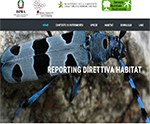On line the Reporting Habitat Directive web site
ISPRA coordinates, on behalf of the Italian Ministry for the Environment and Protection of the Land and Sea (IMELS), the reporting activities for the drafting of the National Report pursuant to Article 17 of the Habitats Directive 92/43 / EEC that Italy must transmit every six years to the European Commission. The report focuses on the conservation status of species and habitats of Community interest and on conservation measures implemented by the country. In particular, in 2012 ISPRA coordinated the drafting of the 3rd National Report for the period 2007-2012 and is currently working at the 4th National Report, relating to the 2013-2018 period, to be completed by April 2019.
In order to allow full access to the information collected, ISPRA has created a website dedicated to the issue, available at the following link: www.reportingdirettivahabitat.it
The site allows access to the relevant documentation and includes specific search functions. By means of queries it is possible to visualize, on a biogeographic scale, the data transmitted for the 3rd National Report concerning distribution, conservation status and trends of terrestrial and freshwater species and habitats. It is also possible to view and download the monitoring sheets containing the specific field protocols for these species and habitats, as well as to acquire all the documentation useful for the completion of the monitoring activities for fulfilling the reporting obligations for the 4th National Report.
The website also allows multiple advanced queries and cartographic research from which it is possible to obtain lists of species and habitats with characteristics defined by the user or present in a particular location. Queries can be set based on: the species taxonomy and the macro-categories of habitats, the Biogeographical Region to which they belong and the overall state of conservation assessed in the 3rd National Report. The overall state of conservation is defined as: "favourable" for habitats or species capable of prospering (in both quality and extent/population) and with good prospects to continue to do so in the future, without any change in management and strategies currently in place; "Inadequate" for habitats or species that require a change in management policies, but not at risk of extinction; "Bad" for habitats or species at serious risk of extinction (at least locally); "Unknown" when the information available is particularly deficient or inadequate to allow a judgment to be made.
The website also takes into account the latest version of the checklist pursuant to Article 17, made available by the European Commission in the appropriate Reference Portal, including all the changes made to the lists of plant and animal species, from the entry into force of the Directive. In the website for the species that have been subject to nomenclatural and / or taxonomic changes, the new name and the relative code recommended for the next reporting are added to the official name given in the Annexes of the Directive.

